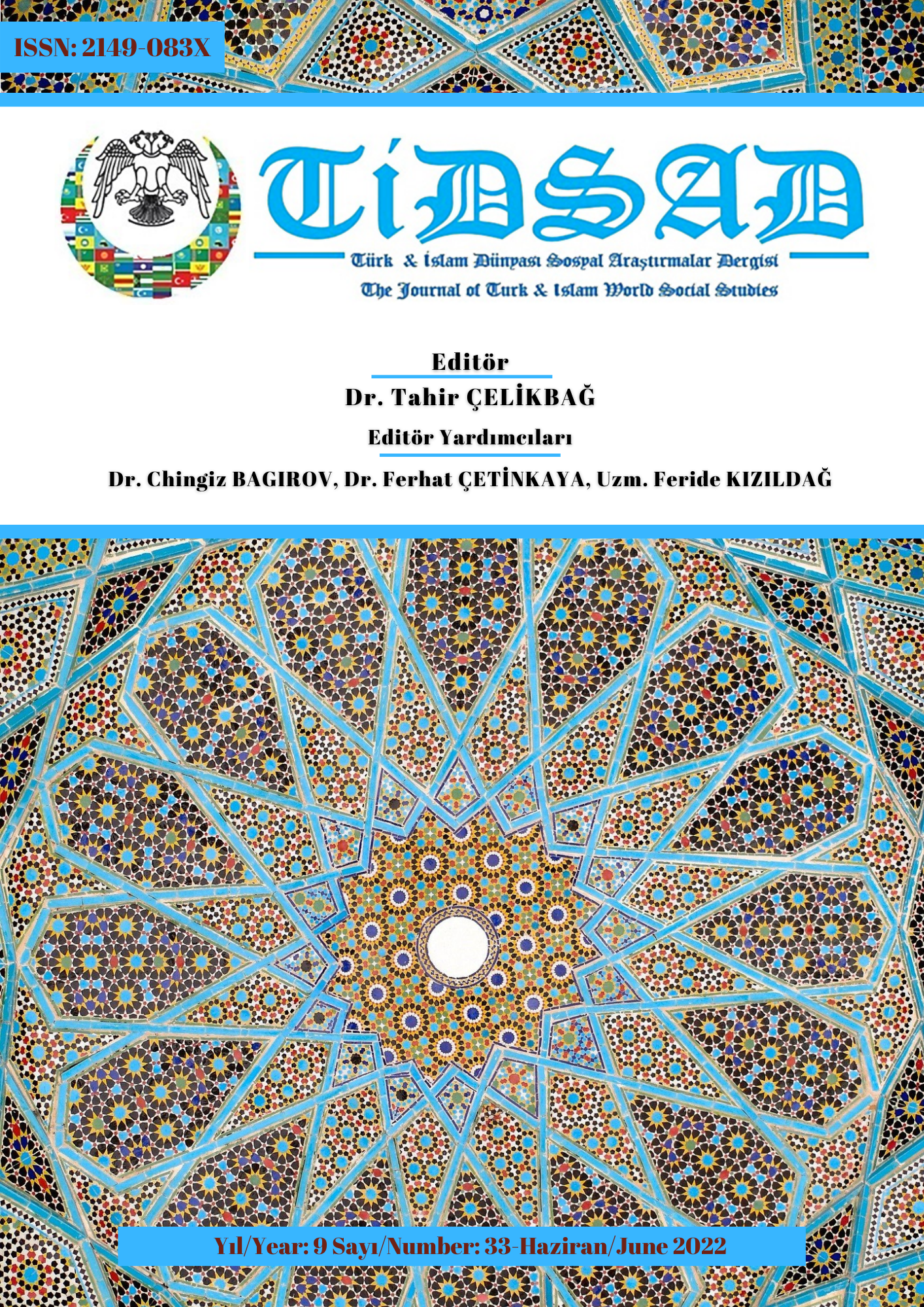Okul Müdürlerinin Etik Liderlik Özellikleri ile Öğretmenlerin Özerklik Davranışları Arasındaki İlişki
Author :
Abstract
Bu çalışmanın amacı, okul müdürlerinin etik liderlik özellikleri ile öğretmen özerkliği arasındaki ilişkiyi belirlemektir. Araştırmanın evrenini 2018-2019 eğitim- öğretim yılında Van ili Edremit, Saray, Özalp resmi ortaöğretim okullarında görev yapan 795 öğretmenden oluşmuştur. Tarama modeline göre yapılan çalışmada basit seçkisiz örneklem yöntemi kullanılmış ve 215 öğretmen örneklem olarak çalışmaya dâhil edilmiştir. Araştırma sonucunda; öğretmenlerin etik liderlik algıları yüksek bulunmuştur. Araştırmaya katılan öğretmenlerin “cinsiyet, yaş” değişkenlerine göre etik liderlik algılarında anlamlı bir farklılık varken “çalıştıkları ilçenin statüsü” değişkenine göre etik liderlik algılarında anlamlı bir farklılık bulunmamaktadır. Araştırmaya katılan öğretmenlerin, öğretmen özerkliği toplam ölçek puanına ilişkin algıları yüksek düzeyde çıkmıştır. Öğretmenlerin “okul türü, görev yapılan ilçenin statüsü” değişkenlerine ilişkin öğretmen özerkliği algılarında anlamlı bir farklılık ortaya çıkmıştır. Öğretmenlerin etik liderlik ve öğretmen özerkliği toplam ölçek puanlarına ilişkin algıları arasında orta düzeyde, pozitif ve anlamlı bir ilişki ortaya çıkmıştır. Araştırmada, etik liderlik ile öğretmen özerkliği arasında pozitif doğrusal bir ilişki saptanmıştır.
Keywords
Abstract
The aim of this study is to determine the relationship between school principals' ethical leadership characteristics and teacher autonomy. The universe of the study consists of 795 teachers who worked in the public secondary schools of Van province Edremit, Saray and Özalp in the academic year of 2018-2019.The simple random sampling method was used in the study conducted according to the scanning model and 215 teachers were included in the study as a sample. As a result of the research; teachers’ ethical leadership perceptions were found to be high. According to the “gender, age” variables of the teachers participating in the research, there was a significant difference in their ethical leadership perceptions, but there was no significant difference according to the teachers’ “status of the district they work in” variable. The perceptions of the teachers participating in the study regarding the total teacher autonomy scale score were found tobe high. In addition, a significant difference has emerged in teachers’ perceptions of teacher autonomy regarding the variables of “type of school, status of the district where they work”. A moderate, positive and significant relationship emerged between teachers’ perceptions of ethical leadership and teacher autonomy total scale scores. In the study, a positive linear relationship was found between ethical leadership and teacher autonomy.
Keywords
- Çelik, N. (2013). Ortaöğretim kurumlarının yöneticilerinin etik liderlik anlayışı ile kurum çalışanlarının örgütsel bağlılıkları arasındaki ilişki (Bursa ili örneği) [Yayımlanmamış yüksek lisans tezi]. Okan Üniversitesi Sosyal Bilimler Üniversitesi.
- Çelik, S. (2016). Resmi liselerde dağıtılan liderlik ile öğretmen özerkliği arasındaki ilişkinin öğretmen görüşlerine göre incelenmesi (Elazığ ili örneği) [Yayımlanmamış yüksek lisans tezi].Hacettepe Üniversitesi.
- Çolak, İ. ve Altınkurt, Y. (2017). Okul iklimi ve öğretmenlerin özerklik davranışları arasın- daki ilişki. Eğitim Yönetimi: Teori ve Uygulama, 23 (1), 33-71.
- Efendi, M. (2018). Yerel turistlerin paket turlarda yaptıkları etik dışı davranışların ve bu davranışlar için etik kodların belirlenmesi. Adnan Menderes Üniversitesi Sosyal Bilimler Enstitüsü: Yüksek lisans tezi.
- Emirbey, A.R. (2017). Etik yöneticilik davranışları ile okul yöneticilerinin öğretmen motivas- yonu arasındaki ilişki [Yayımlanmamış yüksek lisans tezi]. Uşak Üniversitesi.
- Erdoğan, H.Ş. (2018). Öğretmenlere göre ortaokul müdürlerinin etik liderlik özellikleri ile öğretmenlerin örgütsel bağlılıkları arasındaki ilişki [Yayımlanmamış yüksek lisans tezi]. Maltepe Üniversitesi Sosyal Bilimler Enstitüsü.
- Gülcan, M.G., Kılınç, A.Ç. Ve Çepni, O. (2012). İlköğretim okulu müdürlerinin etik liderlik davranışını gösterme düzeylerinin çeşitli değişkenler açısından incelenmesi. Türk Eğitim Bilimleri Dergisi, 10 (1), 123-142.
- Gültekin, M. (2008). İlköğretim okulu yöneticilerinin etik liderlik davranışını gösterme dü- zeylerinin çeşitli değişkenler açısından incelenmesi [Yayımlanmamış yüksek lisans tezi]. Selçuk Üniversitesi.
- Haban, M.M. (2018). Ortaokul kurum yöneticilerinin etik liderlik düzeylerinin öğretmen algıları bağlamında incelenmesi. Akademik Sosyal Araştırmalar Dergisi, 6 (70), 434451.
- İskele, A. (2009). İlköğretim okulu yöneticilerinin etik liderlik davranışlarının okullardaki yaratıcı iklime etkisi [Yayımlanmamış yüksek lisans tezi]. Akdeniz Üniversitesi.
- Karasar, N. (2018). Bilimsel araştırma yöntemi. Nobel Akademik Yayıncılık.
- Karasar, N. (2016). Bilimsel araştırma yöntemi. Nobel Yayıncılık Dağıtım.
- Konak, M. ve Erdem, E. (2014). İlköğretim okulu yöneticilerinin etik liderlik davranışları ile çatışma yönetimi stratejileri arasındaki ilişki öğretmen görüşlerine göre. Eğitim Yönetimi: Teori ve Uygulama, 21 (1), 69-91.
- Küçükkaraduman, E. (2006). İlköğretim okulu müdürlerinin etik davranışlarının incelenme- si (Ankara İli, Mamak İlçesi Örneği) [Yayımlanmamış yüksek lisans tezi]. Gazi Üniversitesi Eğitim Bilimleri Enstitüsü.
- Levent, A.F. (2019). Eğitimde etik ve etik (Ed.). Nobel Akademik Yayıncılık.
- Mahmutoğlu, A. (2011). Türkiye yönetiminde merkezi yönetim-yerel yönetim-sivil ilişkile- rinin geleceği. Türk İdari Dergisi, 741-472.
- Özen, Y. ve Gül, A. (2007). Sosyal ve eğitim bilimleri araştırmalarında evren örnekleme problemi. KKEFD / JOKKEF, 15,394-422.
- Özlem, D. (2019). Etik, ahlak felsefesi. Notos Kitap Yayınevi.
- Şentürken, C. (2018). Ortaöğretim öğretmenlerinin özerklik davranışları ile iş doyumları arasındaki ilişki. Dumlupınar Üniversitesi Eğitim Bilimleri Enstitüsü: Yüksek lisans tezi.
- Toytok, E.H. (2014). Öğretmenlerin algılarına göre okul yöneticilerinin etik liderlik davra-
- Uğurlu, C.T. (2012). İlkokul öğretmenlerinin yönetici etik liderlik davranışı algıları. C.Ü Sosyal Bilimler Dergisi, 36 (2). 203-213.
- Ünverdi, D. (2016). Okul yöneticilerinin etik liderlik davranışları ile öğretmenlerin iş doyum- ları arasındaki ilişki [Yayımlanmamış yüksek lisans tezi].
- Yazıcı, A.Ş. ve Akyol, B. (2017). Okul müdürlerinin liderlik davranışları ile öğretmen özerk- liği arasındaki ilişki. Uluslararası Eğitim Bilimleri Dergisi, 4(10), 189-208.
- Yabin, Ö. (2015). Öğretmenlerin algılarına göre, ortaöğretim okulu yöneticilerinin etik lider- lik davranış düzeylerinin çeşitli değişkenler açısından incelenmesi [Yayımlanmamış yüksek lisans tezi].
- Yağmur, A. (2013). Etik liderlik ve etik iklimin etik dışı davranışlar üzerindeki etkisi: ampirik bir çalışma [Yayımlanmamış yüksek lisans tezi]. Gebze Yüksek Teknoloji Enstitüsü Sosyal Bilimler Enstitüsü.
- Yılmaz, E. (2005). Okullarda örgütsel güven ölçeğinin geçerlik ve güvenirlik çalışması. Sel- çuk Üniversitesi Sosyal Bilimler Enstitüsü Dergisi, 14, 567-580.
- Yoldaş, A. (2018). Okul yöneticilerinin etik liderlik davranışlarının öğretmenlerin örgütsel adalet algıları üzerindeki etkilerinin incelenmesi [Yayımlanmamış yüksek lisans tezi]. Bahçeşehir Üniversitesi Eğitim Bilimleri Enstitüsü.
- Yorulmaz, Y. İ., Çolak, İ. ve Sağlam, A. Ç. (2018). Öğretmenlerin yapısal ve psikolojik güç- lendirme ile özerklik davranışı arasındaki ilişki. Eğitim Bilimleri Araştırmaları Dergisi, 8 (2), 97-112.





